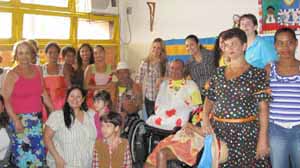By Barb Arland-Fye

DAVENPORT — Some St. Ambrose University nursing students will study in Ecuador during spring break this month while the university’s president, Sister Joan Lescinski, CSJ, visits education students already in Ecuador for study abroad. Still other students will travel to Northern Ireland over spring break to study war, peace and reconciliation. Another group will visit Belize to study tropical marine biology. And in April, Early Childhood Education students will travel to Italy.
These trips are among a growing array of study abroad experiences St. Ambrose University offers as part of a multifaceted approach to broadening its global perspective.
Ryan Dye, director of International Education for St. Ambrose, said a strategic plan has been submitted to the administration which envisions boosting the international student population on campus from .75 percent today to 3.5 percent by 2020 and the student body’s participation in study abroad programs from 4 percent to 10 percent.
“This is one of many strategic initiatives, but we see this one as an important one because it’s tied to our mission and our core values,” said Paul Koch, vice president for Academic and Student Affairs at St. Ambrose. Not every student can study abroad, but “I think it’s important that every student be exposed to students from different cultures around the world.”
The university has 37 international students from 20 countries, including India, Brazil, Tanzania, Germany, France, Lithuania, Northern Ireland and Saudi Arabia. “Next year we expect up to 15 students from China coming here,” Dye said.
“We’ve signed agreements with institutions in both China and India to facilitate their students coming here to earn degrees. China and India both have growing middle classes with more people interested in and able to afford an American education. It’s part of our mission to enrich the lives of all students, including these international students.”
Meanwhile, approximately 140 St. Ambrose students participate in short-term or semester-long study abroad experiences. The value of a study abroad experience is “huge for my students who are going to work in health care,” says Christine Urish, a professor in the Master of Occupational Therapy Department at St. Ambrose. Periodically since 2007, she has taken students on a month-long study abroad experience to Ilheus, Bahia in northeastern Brazil. The future occupational therapists “need to have an appreciation that other people are different than themselves. Understanding those cultural differences is significant in helping clients to be successful in their daily living.”
This June, Urish and her study abroad students will bring prosthetic arms to a Brazilian who lost his limbs in an accident at work. That project resulted from a collaborative effort between St. Ambrose’s occupational therapy and engineering departments and a Virginia university’s engineering department. “We’re enriching our lives and the lives of others,” she said.
In hopes of increasing longer-term study abroad experiences, St. Ambrose anticipates becoming part of a consortium of 40 colleges and universities engaged in that effort. A visit with consortium representatives may happen next fall.
Among other initiatives, St. Ambrose plans to expand its International Studies curriculum and offer more opportunities for multicultural activities and living experiences. In the 2012-13 academic year, West Hall on campus will provide a multicultural living experience for American and international students interested in being part of such a community, Dye said.
International education has developed into a full-time job for Dye, who oversees an office that includes an international student advisor and a study abroad coordinator.
“We talk a lot in our office about reaching the tipping point: where it becomes second nature for incoming students to be thinking about study abroad and taking classes that involve international topics; where it becomes second nature to interact with international students; where it becomes second nature to think about internationalizing your classes or attending a multicultural event,” Dye explained. “That’s a big challenge, particularly since we’re a relatively small school in Iowa where there’s not a lot of diversity. It’s something that is going to take a multifaceted approach with a lot of commitment by a variety of constituencies across campus.”
Recognizing the world’s interconnectedness is essential. “Gosh, we had the next president of China visiting in Muscatine, Iowa. More and more jobs are becoming global in nature. An increasing number of employers are saying that having an international perspective is something they’re looking for in prospective employees,” Dye added.
“It’s absolutely vital for our kids to have international experience,” agrees Allan Ross, executive director of the Jewish Federation of the Quad-Cities, who earned a master’s degree at St. Ambrose and has a son who earned both his bachelor’s and master’s degrees at the university. The elder Ross helped access funding and provided logistics for a two-week study abroad program to Israel in January for business students. “The world is so much smaller these days and without the international experience we won’t be able to compete and our kids won’t be able to compete in the global economy.”
Being competitive is important, but equally important is an appreciation for diversity, one of St. Ambrose’s core values. As such, Koch notes: “We would be doing our students and, ultimately, society a great disservice if our students didn’t understand the rich world in which they live.”
(Editor’s note: Next week’s edition will feature study abroad experiences in Brazil.)








